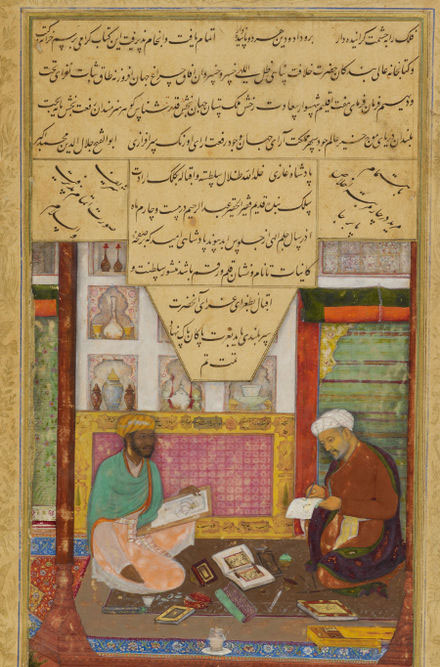Etymology of Diwan
The word Diwan (ديوان) comes from Pahlavi (Middle Persian) or Arabic. It first appeared in the 7 th century and has held different meanings since then.
Administration and offices
Under the Caliphate of Omar Ibn al Khattab (634-644), diwan comes to mean a register, then in a broader sense, a
registration office for individuals or tribes who come to swell Muslim troops. The term’s meaning subsequently
expanded to cover all of the ministries that deal with the major administrative functions of the State: the Chancellery
(diwan al rasaïl), the Army (diwan al jaysh), the Treasury and the Customs Service.
In spreading throughout the Islamic world and as far as India, a diwan came to designate all of the representative
offices of the central administration. Under the Ottoman Empire, the divan (in Turkish) simply took on the meaning of
central government with the Sultan at its head. It is both a council and a council room. By analogy, diwan can also
mean the reception room, a place to smoke hookah or the furniture found in such a room. The latter meaning gave us
the English word divan, a couch-like sitting furniture or a low modern bed, popularized in Europe in the 19 th century
and found in boudoirs, coffeehouses or psychoanalysts’ consulting-rooms.
Poetry
In the Arab world, and specifically in Palestine, the diwan refers to the council of the members of the same hamouleh
(an enlarged family), and to the place dedicated to these meetings. Whether for a marriage, a bereavement, a sale, an
inheritance or a dispute settlement, the diwan is the place – other than the family home – where common affairs are
settled and in front of witnesses. As such, Diwan could not represent better the spirit of contact and discussion so dear
to Diwan Voyage.
 Mughal scribes at work, collecting
Diwans (miniature by Daulat, 1610)
Mughal scribes at work, collecting
Diwans (miniature by Daulat, 1610)
The family diwan: a place of hospitality and exchange
Finally, a Diwan is a poetry book – usually written in rhyme and sometimes in prose – or a volume of poems from different authors on the same theme.
One of the best-known examples of such classical poetic work is the Diwan al Shams al Tabriz, written by Rumi in 13 th century. He was one of the
Persian mystics who had the strongest impact on Sufism.
Within the context of the Orientalist movement in 19 th century Western Europe, diwan refers to the most famous volume of poetry, i.e. the West-
Eastern Diwan, written by Goethe in 1819 and inspired by Ottoman classics.
Modern Palestinian poetry has perpetuated and renewed the tradition of oral poetry, elevating it to the rank of cultural resistance – the “I” of classical
poetry has yielded to the “we” of a national collective identity. Mahmoud Darwish’s Diwan is one of the finest illustrations of this phenomenon.


